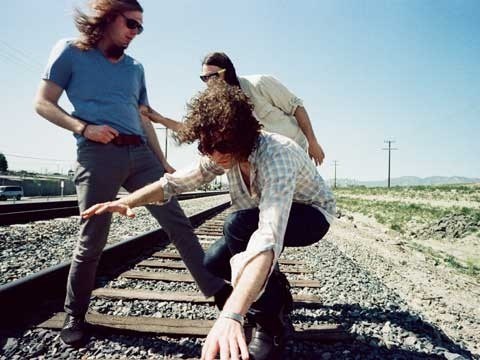WHAT : Hot Hot Heat
WHEN : Thursday, Sept. 23, 9 p.m.
WHERE : GLC
COST : $15
Steve Bays's voice is graveled and he sounds tired. Or bloated. His band, Hot Hot Heat, has just finished up at a waffle house in Hubbards, Ohio and we all know about the food quality in Smalltown, U.S.A. It's a little stop on a massive eight-month-long tour, with only a few brief stops at home in Vancouver. Such is the life.
"I'm just doing little things to stay entertained," he said. They're shooting some tour diaries to post on their website to pass the time. Their tour van has Internet, which makes a big difference. And they try not to drink too much.
"You see a lot of bands that are just starting to do the touring thing and it's funny, they're partying like it's their birthday every night," he says. "But it's very emotionally draining, you get homesick easily if you do that, I find. That's not to say we don't pound a few beers. That would be an understatement."
The man speaks from experience. They had their fun. They were the B.C. Buzz Band in 2002 after they dropped their debut album Make Up the Breakdown , led by the indie standout Bandages. It was a radio staple at a time when indie rock was surging upward to dominate both critical and mainstream tastes. Pitchfork, arguably the most influential musical trendsetter over the past decade, named the album #20 of the best 50 albums of 2002. They were on the cover of magazines. They traveled the world. Life was crazy different and it got to their heads, Bays says.
"It is a weird thing because it's one these jobs where there's a constant review panel watching you and critiquing what you do all the time. It's a really bizarre thing, especially for a job that's so creative."
That review panel hasn't been all that kind to Hot Hot Heat the past few years. The reviews were less than stellar for their next two albums. Pitchfork turned on them and a lot of it had to do with their jump from an independent to a major label. Bays said they made the jump to Sire Records (owned by Warner Bros.) for the money. The money to record, that is. To record albums. That's all he cares about. He wanted to record in the studios he had read about growing up - the studios any kid with musical ambitions dreams about - and the success of Breakdown had earned them enough clout in the industry to actually pull that off.
It didn't work out as they had hoped.
"You can take what's good about a major label, take the recording money that they give you to make an album, and if you're bullheaded you can fight the producer," he says. "There are a lot of bands that go into it and say, 'Well, they know more about than I do so I'm just going to trust every decision that they make.' That's a mistake."
He says the band trusted Sire more than they should have. They fought for more creative control as time went on. They lost their original guitarist, Dante DeCaro, in the process. He went on to join Wolf Parade later that year.
"When you have that many people weighing in on your band, there are so many opportunities for creative decisions to be made on your behalf that are a total bum-out."
Heads were a-butting and the label and the band parted ways. Bays built his own studio in Vancouver's Gastown, where they recorded their new album, Future Breeds , enlisting ex-Limblifter/Age of Electric member Ryan Dahl to produce.
It's certainly a different album from their major-label output. Where those albums felt restrained and glossed over, Future Breeds is dense and restless. Every instrument pressed right up against the listener's eardrum. The higher-register Bays of Bandages has been traded in for a something more gravelly, a reminder of the hard-partying touring years he has left behind. It's the sound of a band that has reclaimed control of their output. It's all quite DYI in comparison and that may be why Bays is happier with Future Breeds than anything they have done.
"When we finished this album, I remember saying to the guys, 'It really doesn't matter what people say about this album. I know it's awesome, I know it's a classic, in my opinion.' I knew it was something special," he said. "If it does get slammed I don't really give a shit."
That said, he is interested to hear or read what the journalists are saying, he just doesn't let it affect him the way it used to. They don't do too many interviews either, just enough to feel "like something is happening," Bays said. They're playing sold out shows in Chicago and Austin and so on. Such is life in a marginally successful indie-rock band.
"Whether Pitchfork likes it just can't be on your top priority list or else you're fucked."




